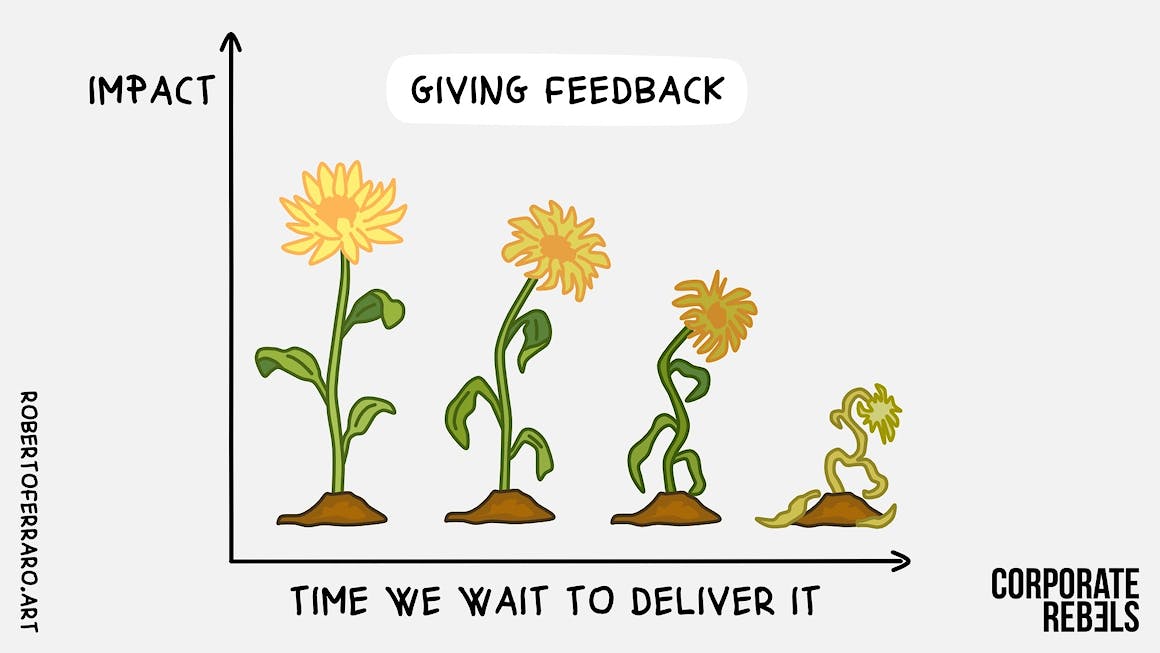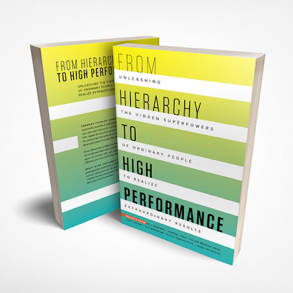By Marc-Peter Pijper and originally published on corporate-rebels.com
Yesterday, I caught my son sneaking a cookie, lovingly baked by his twin sisters, from the jar just before dinner. As a parent, I had a choice to make: Wait until the end of the year to address his behavior or offer immediate feedback and guidance.
All complex systems, from nature to cities, from your own household to your workplace, thrive on feedback. The real question is: What kind of feedback do we need?
Most organizations stick to the rigid schedule of annual performance management cycles, with managers hoarding valuable feedback until it’s often too late to have any meaningful impact.
At the same time, employees are tasked with seeking feedback from their colleagues, often resulting in a collection of positive reviews to secure that coveted pay raise, rather than addressing the areas that genuinely need improvement. In this approach, feedback largely fails to achieve its objective: improving performance.
And let’s face it – who in their right mind wants to wait an entire year to find out if they’ve been on the right track? In reality, the frequency of feedback directly influences an individual’s performance, not to mention their ability to operate effectively in complex systems like a company. Or, in my son’s case, within our family household.
All of this begs the question: Why do we persist with these bottled-up, annual performance reviews in our workplaces?
Blame it on our schooling system
The answer probably lies in the way we are raised as human beings. It all starts at school, where the focus is primarily on individuals. You teach the individual, they take individual exams at the end of the year, and their intelligence and performance are measured based on a simplistic, linear causation. But let’s be real – kids don’t exist in their own private, measurable bubbles. They live and operate in complex systems that significantly influence how they perform individually, and vice versa.
Science tells us that intelligence and performance are all about collectives. We actually all know it, even in our organizations. Any decent manager (hopefully) understands it’s not about individuals; it’s about the team. And yet, the majority of management tools still are about rewarding individuals rather than building the structure to support the collective.
Performance reviews: to scrap or not to scrap?
So, should we scrap annual reviews altogether? In general, I’d say yes – especially the top-down ones (peer-to-peer feedback is way more effective). However, this doesn’t mean we should have a free-for-all either. All complex systems, from nature to cities, from your own household to your workplace, thrive on feedback. The real question is: What kind of feedback do we need?
Drawing from the cookie-stealing incident, a lengthy year-end report card wouldn’t have helped my son’s development. In fact, immediate feedback and a conversation highlighted the root cause: he was simply hungry that day due to a shortage of lunchtime at school.
Whether it’s my son’s sudden craving for cookies or your employee’s shift in work performance, life and work are journeys into the unknown that require real-time feedback, a continuous conversation keeping everyone in line with their contextual realities.
Perfect performance feedback
The way forward involves an iterative process, creating a feedback-rich environment where each adjustment, each collaborative effort, leads towards small improvements.
There’s quite a lot of good online content on alternative feedback systems, such as Spotify’s performance management model. They ditched the calendar and introduced a real-time performance discussion with squad reviews, peer feedback, manager’s 1:1 development talks, and an in-house tool that enables you to seek feedback from anyone within the company at any time.
Additionally, there are plenty of quality feedback courses available – I must give a shoutout to the Corporate Rebels course ‘Upgrade your feedback approach‘; it’s definitely a good one!
Yet, to truly modernize performance feedback, it isn’t enough to copy existing models or simply participate in courses. These are mere sources of inspiration, but the most important step is moving away from outdated mental models of causation and individualism.

Nobody grows in isolation
No one performs at their best when they’re left in the dark about their progress for an entire year, and no one thrives in isolation. Remember, performance is not about individuals; it is about the collective efforts of the team.
So, it’s high time we reconsider the rigid annual review process. The shift should lead us toward more frequent and thorough peer-to-peer feedback, leaving behind old notions of punishment and rewards, and instead embracing growth, learning, and improvement.
Think of it like that one cookie, kept locked away in a jar until the end of the year. You have no idea of its taste and texture – it could be the best cookie you ever tasted, or it could be too sweet or too salty. Now imagine you get the chance to taste a bit regularly and share feedback immediately, allowing you and the baker to improve the recipe right away.
It’s undoubtedly a complex process, but the way forward is clear – it’s time to fix the system, one feedback at a time. And remember, while you’re at it, don’t forget to share those cookies!
Republished with permission. Featured Image/graphic link added by Enlivening Edge Magazine. Image by Victoria from Pixabay





Very useful advice on giving feedback. Earlier insights are provided in Charles S. Jacobs’s book “Management Rewired – Why Feedback Doesn’t Work and Other Surprising Lessons from the Latest Brain Science.” For continuous, collective feedback, why not use your people-centric business model for that purpose. Intro articles here in EE by Ehin and Meggitt provide some general background on this via “VES” and “WST”, or follow learning updates on https://ves.ghost.io/